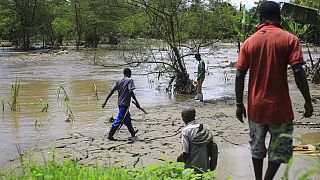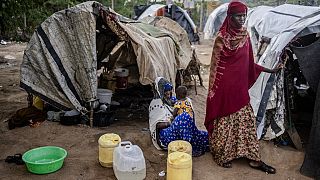El Niño
A recent report from the World Food Programme (WFP) highlights the escalating food insecurity crisis in eastern Africa, exacerbated by a combination of drought and devastating floods linked to the El Niño phenomenon.
The grim situation is particularly evident in Somalia, where levels of hunger are reported to be among the worst in a decade, as shared by Petroc Wilson, Head of Communications at WFP Somalia.
The challenges faced by communities in the region are vividly captured in footage provided by the organization, showcasing extensive flooding in central Somalia. The scenes depict some communities submerged chest-high in water, illustrating the severity of the crisis. These alarming developments coincide with the gathering of world leaders in Dubai for the COP28 climate talks.
Petroc Wilson emphasizes that climate shocks, including El Niño and the broader climate crisis, have inflicted severe hardships on families already living in dire conditions. The impact is especially pronounced in Somalia, where deadly floods have compounded the struggles of those already grappling with food insecurity, following the longest recorded drought in the country's history.
The Intergovernmental Panel on Climate Change (IPCC) has projected that up to 80 million people could face hunger by mid-century, predominantly in Sub-Saharan Africa, South Asia, and Central America. The effects of climate change are evident in Ethiopia, Somalia, and Kenya, where consecutive below-average rainy seasons have left 23.4 million people acutely food insecure, according to a July report from the World Food Programme.
In addition to decimating livestock herds, the prolonged drought has significantly reduced local food supplies, leading to a surge in food prices. The situation is further complicated by heavy flooding that struck parts of Somalia and Kenya in November, threatening to exacerbate the existing food crisis.
The impact of extreme weather events on global agriculture is not limited to eastern Africa. From the most severe drought in forty years in the Horn of Africa to record-breaking heatwaves in Argentina, climate change is proving to be a significant disruptor. The World Weather Attribution (WWA) group reported that Argentina experienced its least healthy crops in 40 years due to drought and record-breaking temperatures, affecting wheat and soybean harvests.
While attributing specific weather events directly to climate change can be challenging, there is a clear pattern of increased severity and frequency of extreme weather events. Warmer temperatures contribute to prolonged droughts, while extreme precipitation events, also exacerbated by climate change, pose a threat to harvests.
The consequences of climate change on agriculture are far-reaching. Lack of water during critical growth stages, extreme temperatures, and erratic precipitation patterns impact crop yields and quality. Livestock, a crucial source of livelihood for many communities, suffer from dried-up watering holes and a scarcity of grazing land. Even in more temperate regions like Europe, unusual climate-induced events, such as cold spells, can have severe consequences for agricultural production.
The IPCC emphasizes the need for adaptive measures in agriculture to mitigate the impact of rising temperatures. Shifting to less water-intensive crops, utilizing drought-resistant seeds, reducing soil erosion, and adopting efficient irrigation systems are among the suggested strategies. However, the effectiveness of these measures diminishes with the projected increase in global temperatures.
As the UN Environment Programme warns of a potential temperature increase of 2.5 to 2.9 degrees Celsius by 2100, urgent global action is needed to address the root causes of climate change and implement sustainable solutions to safeguard food security for vulnerable populations worldwide.












Go to video
Paraguayan town celebrates vibrant Kamba Ra'anga festival with masks, fire and tradition
00:56
South Africa: At least 101 dead in Eastern Cape floods as rescue efforts continue
01:47
Chinese city of Xuchang is world's biggest producer of wigs
01:15
U.S. considers adding more African countries to travel ban
00:41
Devastating floods in Eastern Cape Leave 78 dead as rescue efforts continue
01:13
Deadly Floods Devastate South Africa’s Eastern Cape: At Least 49 Dead, More Missing